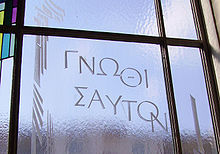Know thyself
This article needs attention from an expert in Classical Greece and Rome. Please add a reason or a talk parameter to this template to explain the issue with the article. (November 2008) |
This article possibly contains original research. (November 2009) |
This article needs additional citations for verification. (November 2009) |

The Ancient Greek aphorism "Know thyself", Greek: γνῶθι σεαυτόν gnōthi seauton (also ... σαυτόν ... sauton with the ε contracted), was inscribed in the pronaos (forecourt) of the Temple of Apollo at Delphi - according to the Greek periegetic (travelogue) writer Pausanias (10.24.1).
The aphorism has been attributed to at least six ancient Greek sages:
- Chilon of Sparta (Chilon I 63, 25)
- Heraclitus
- Pythagoras
- Socrates
- Solon of Athens
- Thales of Miletus
Other sources attribute it to Phemonoe, a mythical Greek poetess. In a discussion of moderation and self-awareness, the Roman poet Juvenal quotes the phrase in Greek and states that the precept descended de caelo (from heaven) (Satire 11.27).
The saying "Know thyself" may refer by extension to the ideal of understanding human behavior, morals, and thought, because ultimately to understand oneself is to understand other humans as well. However, the ancient Greek philosophers thought that no man can ever comprehend the human spirit and thought thoroughly, so it would have been almost inconceivable to know oneself fully. Therefore, the saying may refer to a less ambitious ideal, such as knowing one's own habits, morals, temperament, ability to control anger, and other aspects of human behavior that we struggle with on a daily basis.
In Latin, the aphorism is generally given as nosce te ipsum[1]. The Latin version of the aphorism is written on a plaque above the Oracle's door in the Matrix film series, where it is rendered in a non-traditional Latin; that is to say temet nosce ("thine own self thou must know") translated in the Matrix as know thyself.[citation needed]
See also
- Introspection
- Self-knowledge
- Ho'oponopono (Self-Identity)
- Self (philosophy)
- Jnana
- Scio nescio
References
External links
- Gnothi sauton at Binghamton University
- Know Yourself by Peter Abelard
